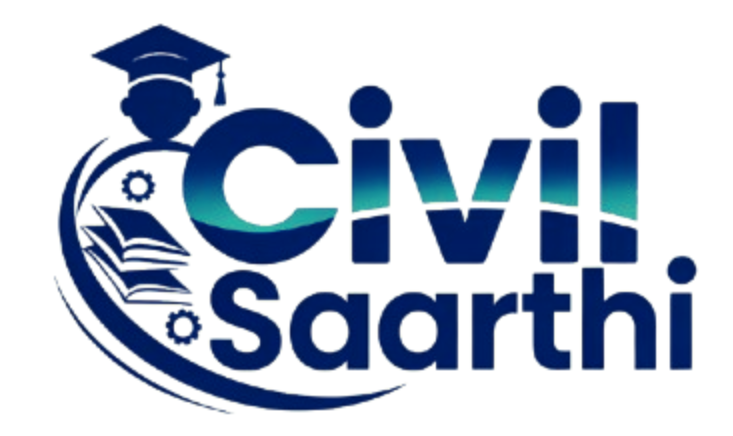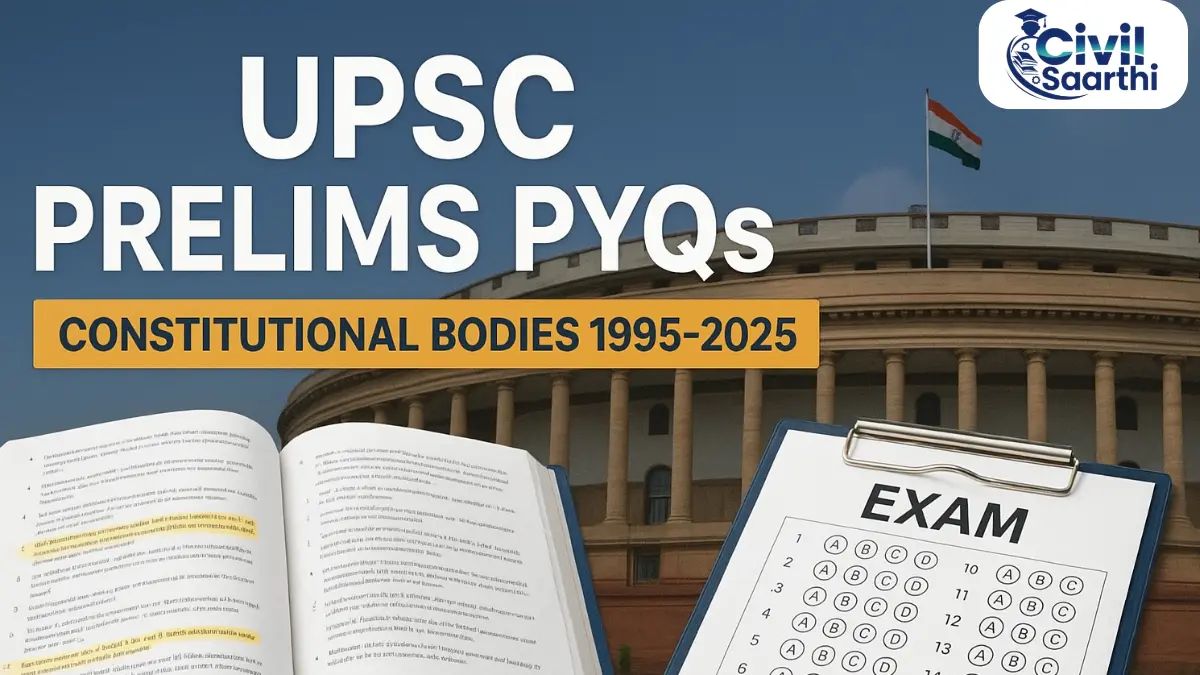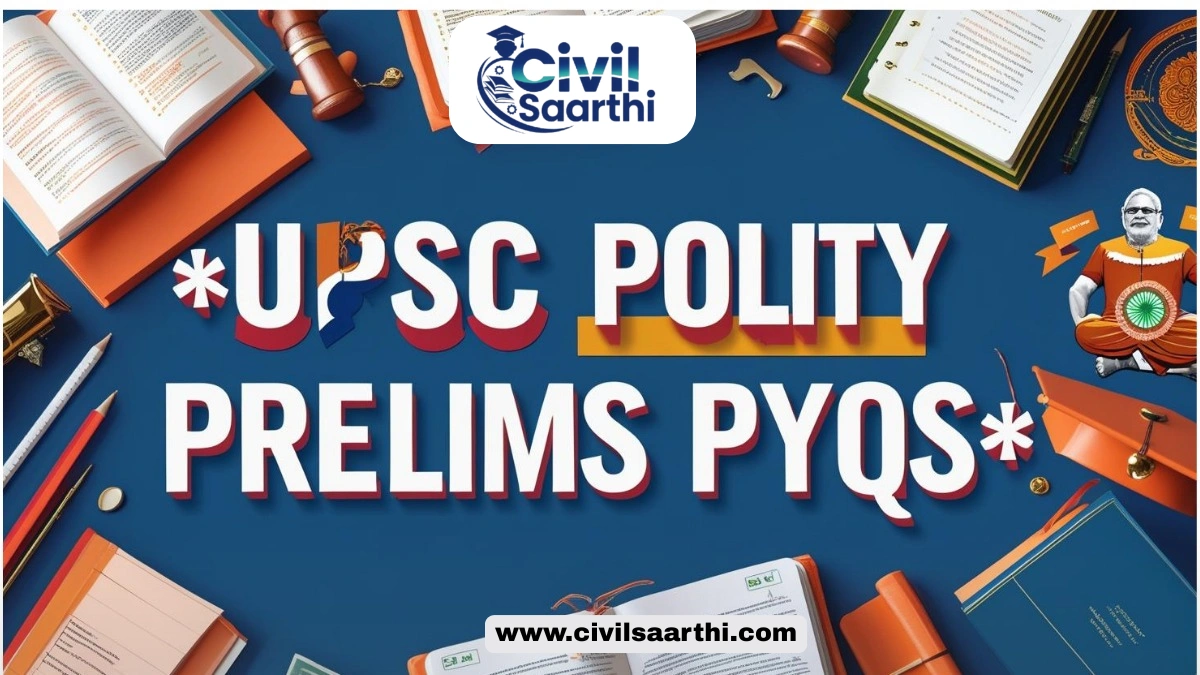Questions on Constitutional Bodies are very important for UPSC Prelims as they test core knowledge of the Indian Constitution. By solving past year questions of UPSC Prelims, aspirants can easily identify high-priority areas and improve accuracy.
UPSC Prelims Polity Topic-wise PYQs on Constitutional Bodies 2025-1995
Constitutional Bodies are an important part of Indian Polity and are regularly asked in UPSC Prelims. These include bodies like the Election Commission of India, CAG, UPSC, and Finance Commission. Solving previous year questions (PYQs) helps to know what type of questions are asked and which topics are important. UPSC Prelims Polity Topic-wise PYQs on Constitutional Bodies 2025-1995 will make preparation easier and more focused.
Q1. Consider the following organizations /bodies in India: [2023]
- The National Commission for Backward Classes
- The National Human Rights Commission
- The National Law Commission
- The National Consumer Disputes Redressal Commission
How many of the above are constitutional bodies?
a) Only one
b) Only two
c) Only three
d) All four
Ans a
Q2. Consider the following: [2023]
- Demographic performance
- Forest and ecology
- Governance reforms
- Stable government
- Tax and fiscal efforts
For the horizontal tax devolution, the Fifteenth Finance Commission used how many of the above as criteria other than population area and income distance?
a) Only two
b) Only three
c) Only four
d) All five
Ans c
Q3. Consider the following statements: [2022]
- Attorney General of India and Solicitor General of India are the only officers of the Government who are allowed to participate in the meetings of the Parliament of India.
- According to the Constitution of India, the Attorney General of India submits his resignation when the Government which appointed him resigns.
Which of the statements given above is/are correct?
a) 1 only
b) 2 only
c) Both 1 and 2
d) Neither 1 nor 2
Ans d
Q4. Consider the following statements: (2017)
- The Election Commission of India is a five-member body.
- The Union Ministry of Home Affairs decides the election schedule for the conduct of both general elections and by elections.
- Election Commission resolves the disputes relating to splits/mergers of recognized political parties.
Which of the statements given above is/are correct?
(a) 1 and 2 only (b) 2 only
(c) 2 and 3 only (d) 3 only
Ans d
Q5. With Reference to the Fourteenth Finance Commission, which of the following statements is/are correct? [2015]
It has increased the share of States in the central divisible pool from 32 percent to 42 percent
It has made recommendations concerning sector-specific grants
Select the correct answer using the code given below.
a) 1 only
b) 2 only
c) Both 1 and 2
d) Neither 1 nor 2
Ans a
Q6. Attorney general of India can
- Take part in the proceedings of Lok sabha
- Be a member of a committee of the Lok sabha
- Speak in the Lok sabha
- Vote in the Lok sabha
Which of the statements given above is/are correct?
a) 1 only
b) 2 and 4
c) 1, 2 and 3
d) 1 and 3 only
Ans c
Q7. In India, other than ensuring that public funds are used efficiently and for intended purpose, what is the importance of the office of the Comptroller and Auditor General (CAG)? [2012]
- CAG exercises exchequer control on behalf of the Parliament when the President of India declares national emergency/financial emergency.
- CAG reports on the execution of projects or programmes by the ministries are discussed by the Public Accounts Committee.
- Information from CAG reports can be used by investigating agencies to press charges against those who have violated the law while managing public finances.
- While dealing with the audit and accounting of government companies, CAG has certain judicial powers for prosecuting those who violate the law.
Which of the statements given above is/are correct?
a) 1, 3 and 4 Only b) 2 Only
c) 2 and 3 Only d) 1,2, 3 and 4
Ans c
Q8. Which one of the following authorities makes recommendations to the Governor of a State as to the principles for determining the taxes and duties which may be appropriated by the Panchayats in that particular State? [2010]
a) District Planning Committees.
b) State Finance Commission.
c) Finance Ministry of that State.
d) Panchayati Raj Ministry of that States.
Ans b
Q9. Which one of the following pairs is not correctly matched? [2007]
a) T.S Krishnamurthy: Former Chief Election Commissioner of India
b) K.C. Pant: Chairman, Tenth Finance Commission of India
c) A.M. Khusro: Former Chairman, Union Public Service Commission
d) R.C. Lahoti: Former Chief Justice of India
Ans c
Q10. With reference to Indian Polity, which one of the following statements is correct? [2002]
a) Planning Commission is accountable to Parliament
b) President can make ordinance only when either of the two Houses of Parliament is not in session
c) The minimum age prescribed for appointment as a Judge of the Supreme Court is 40 years
d) National Development Council is constituted of Union Finance Minister and the Chief Ministers of all the States
Ans b
Q11. Which one of the following duties is NOT performed by the Comptroller and Auditor General of India? [2001]
a) To audit and report on all expenditure from the Consolidated Fund of India
b) To audit and report on all expenditure from the Contingency Funds and Public Accounts
c) To audit and report on all trading, manufacturing, profit and loss accounts
d) To control the receipt and issue of public money, and to ensure that the public revenue is lodged in the exchequer
Ans d
Q12. Consider the following statements about the Attorney General of India: [2000]
I. He is appointed by the President of India.
II. He must have the same qualifications as are required for a Judge of the Supreme Court.
III. He must be a member of either House of Parliament.
IV. He can be removed by impeachment by Parliament.
Which of these statements are correct?
a) I and II b) I and III
c) II, III and IV d) III and IV
Ans a
Q13. The primary function of the Finance Commission in India is to: [2000]
a) Distribute revenue between the Centre and the States
b) Prepare the Annual Budget
c) Advise the President on financial matters
d) Allocate funds to various ministries of the Union and State Governments
Ans a
Q14. Which of the following is/are extra constitutional and extra legal device(s) for securing cooperation and coordination between the States in India? [1995]
I. The National Development Council
II. The Governors’ Conference
III. Zonal Councils
IV. The Inter State Council.
Choose the correct answer from the codes given below:
a) I, II and III b) I, III and IV
c) III and IV d) IV only
Ans a


